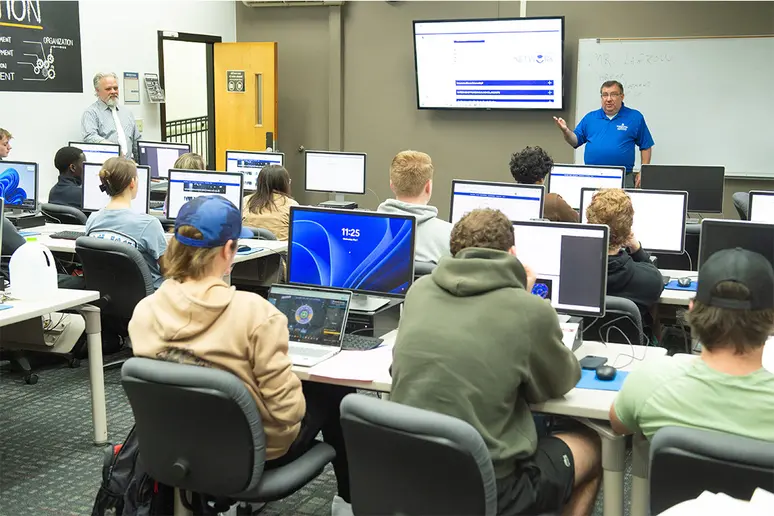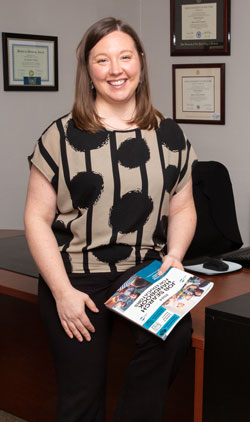

Chris LaGrow (right), with Computer and Information Sciences Adjunct Lecturer Gregory Cole, in his CSIT 251 class.
Accepted Students ONLY!
Join us Saturday, March 28 (10 AM–2 PM) for Go Big BLUE DAY — sessions, tours, and giveaways.
Sign Up Today!


Chris LaGrow (right), with Computer and Information Sciences Adjunct Lecturer Gregory Cole, in his CSIT 251 class.
It’s really never too early for students to begin exploring internship opportunities and recognizing the contribution the short-term supervised work experiences can ultimately play in a successful job search.
The Career Development Office (CDO) and its extensive resources are ideally positioned to partner with students to support them in their pursuit of valuable internship opportunities related to their major or career goals. Internships integrate classroom knowledge into a workplace setting. Academic credit is also attached to every internship, and some include cash stipends.
To convey how valuable internships can be to students, the CDO frequently gives student presentations on the road, so to speak, and meets directly with students in their classes.

Office of Engagement and Career Development Interim Director Chris LaGrow and Internship Coordinator Jennifer Wilkins give numerous classroom presentations throughout the academic year – some that are general in nature, usually to first-year students and sophomores, and others, geared to juniors and seniors, that are most-often focused on specific topics, such as tips to compose effective cover letters and resumes, and how to prepare for interviews, the job search and more. All are customized to each audience.
“There’s always been the focus on the student first; they have to get that hands-on experience in an internship,” Ms. Wilkins said. It’s important to make sure the student has an internship experience that’s very purposeful and connected to the student’s learning goals.
“We enjoy doing these presentations; it’s part of our outreach, a way to teach a lot of students at once, but it’s also information that every student is going to need at some point,” Mr. LaGrow added. “We’re happy to make ourselves available for these kinds of presentations.”
A late-semester presentation LaGrow gave was to two sections of CSIT 251 Information Systems Structures, taught by Adjunct Lecturer Gregory Cole.
“I was getting to a chapter of careers, and was going to deliver the instruction, and then thought to myself, that the students would get more of a benefit from the CDO and (learn about) all their resources,” Mr. Cole explained. His course draws students from multiple class years, primarily from the School of Business and Department of Computer and Information Sciences.
All key topics were there for the students: resumes, cover letters, interview preparation, internships, the annual job/internship expo, graduate school fair and more. “We spent more time on the internship process and how it works, what we can do to help and support them in their search, and then the last segment of the presentation was on the skills that employers are seeking,” LaGrow said.
The skill needs compilation LaGrow presented is based on an annual survey by the National Association of Colleges and Employers which includes input from hundreds of employers. LaGrow shares the top 12 skills/values/traits list with students so they can check to see which skills they currently possess, and which they should find ways to develop before graduating. It’s not a wholesale turnover of skills, but the order or ranking of the skills does change from year to year.
“They’re all important, they all matter, but it’s just a matter of by how much and how widely the rankings change,” LaGrow noted.
Students can log into FREDNetwork powered by Handshake, a web-based career service management system the CDO provides that make it easy for them, and alumni as well, to connect with internship providers and prospective employers, LaGrow explained. It’s job hunting on the go made easy with the Handshake app.
CDO class presentations went over well with Cole’s students.
“The students gave me outstanding feedback; many of them have already begun their job or internship search,” Cole reported.
More students reach out to the CDO for assistance as a result of these presentations, according to LaGrow.
“This presentation has already led to a handful of appointments; it motivated some students to see us,” LaGrow noted. “On the way out of the class, many said this (presentation) was very helpful and that ‘I’ll definitely be stopping in’ to the CDO.”
The CDO tailors classroom presentations based on where the students are in their academic journey. Talks for first-year students focus on careers and foundation courses in different academic areas, while the concentration shifts to resumes and interviewing skills for juniors and seniors.
“After these presentations, some classes make it an assignment to have their resume reviewed by one of us. This lets us give them more personalized, individual assistance,” LaGrow said. “They will need a resume at some point, so it’s never too early to get started.”
At all classroom talks, LaGrow advises students the CDO is open year-round, including summers. “It’s not widely known, but our services are available to them even after they graduate. They may think that they’re on their own after Commencement, but they’re not, and we try to let them know that.”